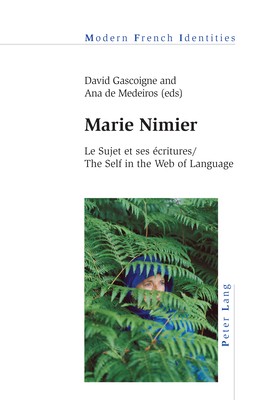
- We will send in 10–14 business days.
- Publisher: Peter Lang UK
- ISBN-10: 180079195X
- ISBN-13: 9781800791954
- Format: 15.2 x 22.6 x 1.8 cm, minkšti viršeliai
- Language: English
- SAVE -10% with code: EXTRA
Marie Nimier; Le Sujet et ses écritures / The Self in the Web of Language (e-book) (used book) | bookbook.eu
Reviews
Description
In the postwar literary culture of France, under the influence of Structuralism and its aftermath, deference to the text in itself meant that literary studies eschewed discussing narrators or characters as subjects and deriving social or political commentary from specific texts. In reaction to this trend, which also influenced the writing of novels, a new generation of authors have sought instead to focus on developing innovative ways of conceptualizing subjecthood, identity and agency.
Marie Nimier's writing abundantly exemplifies this return of the subject in the rich diversity of the fifteen novels she has published since Sirène in 1985, blending fiction and life-writing. Her narrators/protagonists typically strive to achieve forms of agency which are made possible, yet also threatened, by the ostensible givens: heritage, memory, gender, relationships, desire, social environment and, not least, language itself. This volume explores central aspects of self and subject in her oeuvre to date and includes two short stories which Nimier formally publishes here for the first time, one with an English translation.
EXTRA 10 % discount with code: EXTRA
The promotion ends in 22d.00:51:13
The discount code is valid when purchasing from 10 €. Discounts do not stack.
- Publisher: Peter Lang UK
- ISBN-10: 180079195X
- ISBN-13: 9781800791954
- Format: 15.2 x 22.6 x 1.8 cm, minkšti viršeliai
- Language: English English
In the postwar literary culture of France, under the influence of Structuralism and its aftermath, deference to the text in itself meant that literary studies eschewed discussing narrators or characters as subjects and deriving social or political commentary from specific texts. In reaction to this trend, which also influenced the writing of novels, a new generation of authors have sought instead to focus on developing innovative ways of conceptualizing subjecthood, identity and agency.
Marie Nimier's writing abundantly exemplifies this return of the subject in the rich diversity of the fifteen novels she has published since Sirène in 1985, blending fiction and life-writing. Her narrators/protagonists typically strive to achieve forms of agency which are made possible, yet also threatened, by the ostensible givens: heritage, memory, gender, relationships, desire, social environment and, not least, language itself. This volume explores central aspects of self and subject in her oeuvre to date and includes two short stories which Nimier formally publishes here for the first time, one with an English translation.


Reviews